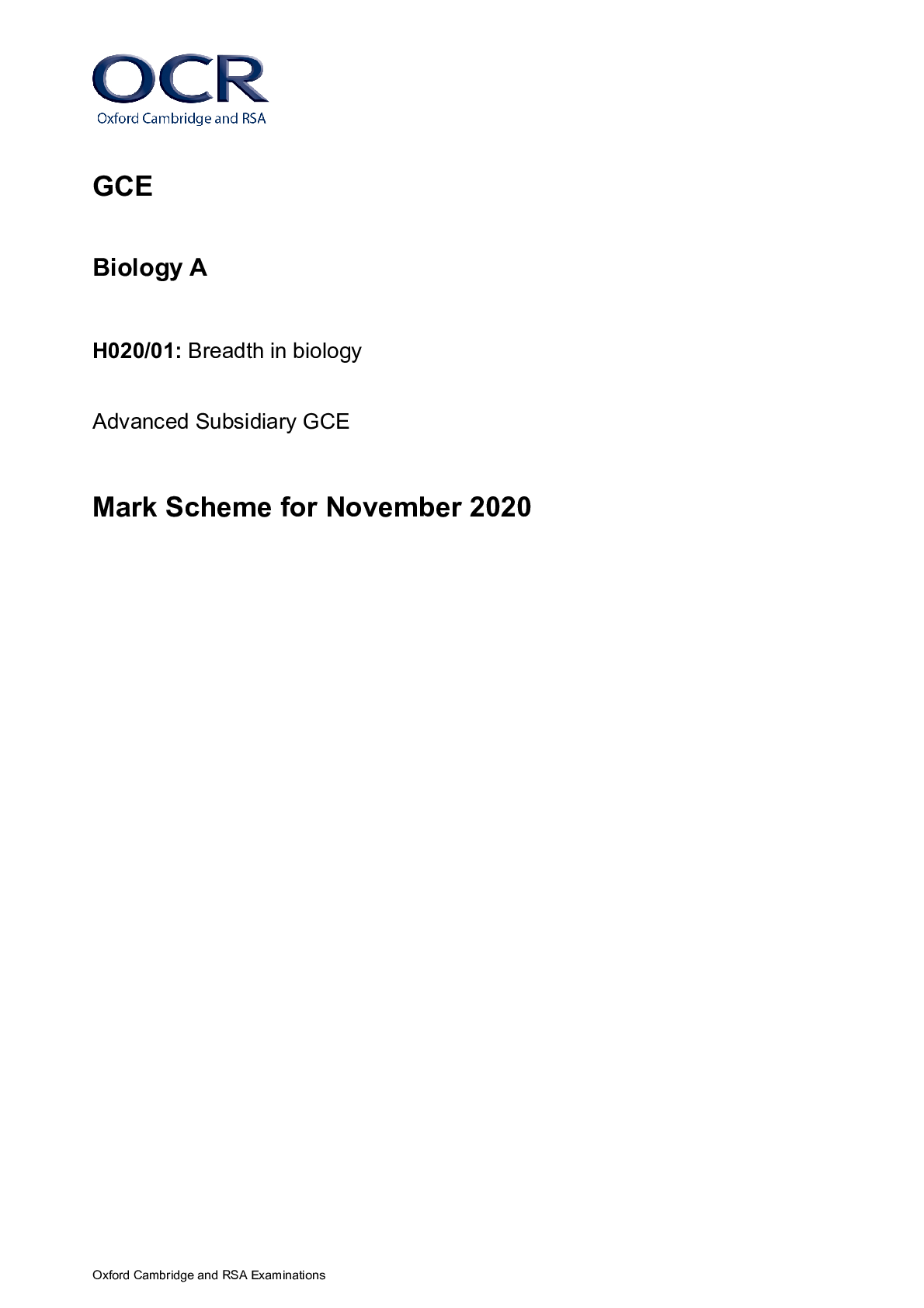Latin > GCSE MARK SCHEME > GCE Latin H443/03: Prose Literature Advanced GCE Mark Scheme for November 2020 (All)
GCE Latin H443/03: Prose Literature Advanced GCE Mark Scheme for November 2020
Document Content and Description Below
GCE Latin H443/03: Prose Literature Advanced GCE Mark Scheme for November 2020 Oxford Cambridge and RSA Examinations GCE Latin H443/03: Prose Literature Advanced GCE Mark Scheme for November 202... 0Oxford Cambridge and RSA Examinations OCR (Oxford Cambridge and RSA) is a leading UK awarding body, providing a wide range of qualifications to meet the needs of candidates of all ages and abilities. OCR qualifications include AS/A Levels, Diplomas, GCSEs, Cambridge Nationals, Cambridge Technicals, Functional Skills, Key Skills, Entry Level qualifications, NVQs and vocational qualifications in areas such as IT, business, languages, teaching/training, administration and secretarial skills. It is also responsible for developing new specifications to meet national requirements and the needs of students and teachers. OCR is a not-for-profit organisation; any surplus made is invested back into the establishment to help towards the development of qualifications and support, which keep pace with the changing needs of today’s society. This mark scheme is published as an aid to teachers and students, to indicate the requirements of the examination. It shows the basis on which marks were awarded by examiners. It does not indicate the details of the discussions which took place at an examiners’ meeting before marking commenced. All examiners are instructed that alternative correct answers and unexpected approaches in candidates’ scripts must be given marks that fairly reflect the relevant knowledge and skills demonstrated. Mark schemes should be read in conjunction with the published question papers and the report on the examination. © OCR 2020H443/03 Mark Scheme November 2020 2 Annotations Annotation Meaning correct - comprehension questions and style of translation incorrect omission Incorrect (comprehension); major error (translation) Slight error Consequential error Repeated errorH443/03 Mark Scheme November 2020 3 Guidance on assessing set-text translation The general principle in assessing each section should be the proportion (out of 5) of sense achieved. The passage is divided into 11 sections, each worth 5 marks. Assessors award up to 5 marks per translated section according to the following grid: Marks Description 5 Accurate translation with one slight error allowed 4 Mostly correct 3 More than half right 2 Less than half right 1 Little recognisable relation to meaning of the Latin 0 = no response, or no response worthy of credit One approach for each section is given. Acceptable alternatives will be illustrated during Standardisation, but examiners should assess on its own merits any approach that satisfactorily conveys the meaning of the Latin – the crucial consideration being the extent to which every Latin word is satisfactorily rendered in some way in the English. Where marks of 4, 3, 2, 1 and 0 are applicable, the overall proportion of meaning conveyed in the section is the only consideration. The determination of what constitutes a 'slight' or 'major' error is only necessary when it is the only error in a section; this distinction will then determine whether a mark of 5 or 4 is appropriate. The classification below should be seen only as a general guide, the intention of which is to maintain standards year-on-year. Lead markers should consider each instance on its own merits, in the context of the passage and the section. Some errors may be regarded as 'major' if they appear in a relatively short and straightforward section, whereas in longer or more complex sections they are more likely to be a 'slight' error. The final decisions on what constitutes 'slight' and 'major' errors will be made and communicated to assessors during the standardisation process, after full consideration of candidates’ responses, and these decisions will be captured in the final mark scheme for examiners and centres.H443/03 Mark Scheme November 2020 4 1. Wrong past tenses are generally considered a 'slight' error, but other tense errors are 'major'. Allowance must be made for other differences of idiom between Latin and English: e.g. ubi venerunt: ‘when they had come’ would be correct; similarly ‘when they came’ for cum venissent. Note also that Perfect Participles can often be appropriately translated as Present. Where there are Historic Presents, the candidate should consistently use the Past or Present; if the candidate is inconsistent, the error should be counted once only, as a 'slight' error. If a candidate repeatedly makes the same error of tense, the error should be counted once only. 2. Vocabulary errors that are close to the right meaning are 'slight' errors; any wrong meaning that alters the sense is 'major': e.g. amicis suasit: ‘he persuaded his friends’ would be a 'slight' error; ‘he spoke to his friends’ would be 'major'. 3. Omission of words is generally a 'major' error. Omission of connectives (e.g. sed, autem, tamen, igitur) that do not significantly affect the sense is usually a 'slight' error. Frequently occurring omissions should be categorised at Standardisation. 4. Errors of number are usually 'major', but where the difference is minimal, they are 'slight': e.g. vinis consumptis: ‘the wine having been consumed’. Sometimes they can be ignored altogether: e.g. haec dixit ‘he said this’; maximi labores ‘very great work’; curae iraeque ‘anxiety and anger’. Each instance should be categorised at Standardisation. 5. Errors of construction are always “major”, unless a construction has been successfully paraphrased: e.g. promisit se celeriter adventurum esse: ‘he promised his swift arrival’. 6. Errors of case are always 'major', unless the containing clause has been successfully paraphrased: e.g. tribus cum legionibus venit: ‘he brought three legions with him’. 7. Change from active to passive is allowable if the agent is expressed, or if the agent is omitted but the sense is not compromised. If the agent is omitted and the sense is compromised, it is a 'slight' error. e.g. regem interfecerunt: ‘the king was killed’ would be allowable if it were obvious from the preceding sentence who killed the king; if it were not clear who killed him, a 'slight' error should be indicated.H443/03 Mark Scheme November 2020 5H443/03 Mark Scheme November 2020 6 Question Content of answer Marks Guidance/ stylistic features 1 a he was under Curio's power/ his 'slave boy' bought for sexual gratification/ used for passion 2 (AO2) or words to same effect b Assess against criteria in the 5-mark grid (above) quotiens te pater eius domu sua eiecit, quotiens custodes posuit ne limen intrares! cum tu tamen nocte socia, hortante libidine, cogente mercede, per tegulas demitterere. quae flagitia domus illa diutius ferre non potuit. scisne me de rebus mihi notissimis dicere? 5 (AO2) Specimen translation How often did his father throw you out of his house! How often did he place guards to prevent you from crossing the threshold/entrance/ entering the house! While you, however, with night for your accomplice, lust urging you on, and payment compelling you, were let down through the roof-tiles/ roof. That house could no longer endure these outrages. Do you know that I am speaking about matters very well known to me? Repeated/consequential errors should not be penalised. Omission of cum = slight error c Curio (son) begged Cicero to defend him against his own father if he asked him for six million sesterces 2 (AO2) 'to pay off Antony's debts' not essential d he stood surety for Antony (for six million sesterces) Curio declared he was unable to bear the misery of being separated from Antony he blazed with love for Antony 3 (AO2) Any three of these points.H443/03 Mark Scheme November 2020 7 he would rather go into exile than be separated from Antony e the consular elections/ Dolabella’s election 1 (AO2) f Assess against criteria in the 15-mark grid (above). Relevant points from the content of the passage Sarcastic reference – Cicero says you could call Antony a Laelius (famous and wise augur) Abuse of power by Antony – once the election of Dolabella was completed, he made a declaration of an unfavourable omen, thus voiding the election Antony had not indicated that he was going to take the auspices It is very suspicious that Antony had already indicated on January 1 that he had the power to hinder elections by taking the auspices! Accuses Antony of making a false declaration which will be to his misfortune, if not the Republic’s as well Unlawful actions against the Roman people in his position as augur and as consul Contradictory behaviour from Antony – at one time he hinders the election of Dolabella (here in February/March), but later accepts it (after Caesar’s murder) Slur of saying that perhaps Antony was drunk when he made the announcement about the auspices 15 (AO3) Stylistic features of the language in the passage bonus augur: sarcastic use of adjective o impudentiam singularem!: dramatic exclamation quid videras, quid senseras, quid audieras?: tricolon of rhetorical questions drives home point that Antony had seen no bad omens neque … dixisti nec hodie dicis: polyptoton from dicere and variation in neque/nec point out that Antony did not say he would take the auspices provideras et tanto ante praedixeras: alliteration of p stresses that Antony had already ‘foreseen’ that bad omens could be observed in this election hercule magna, ut spero, tua potius quam rei publicae calamitate ementitus es auspicia: dramatic exclamation hercule > Cicero’s shock, and emphatic early position of magna > Antony has acted in a greatly destructive manner quam diu tu voles, vitiosus consul Dolabella; rursus, cum voles, salvis auspiciis creatus: repetition and alliteration of v underlines how all is dependent on Antony’s fickle will; ellipsis of verbs adds directness to the pointH443/03 Mark Scheme November 2020 8 Question Content of answer Marks Guidance/ stylistic features 2 a Assess against criteria in the 15-mark grid (above). Relevant points from the content of the passage Galba’s sound-bite that he chooses soldiers and does not buy them –> previous corrupt practices that he intends to eradicate The emperor is a weak old man who is crippled by the hatred people feel for Vinius’ crimes and the laziness of Laco Galba’s approach to Rome was bloody > the murders of Varro and Turpilianus Executions carried out with not even the chance of a defence hearing Thousands of unarmed soldiers massacred as Galba entered Rome City saturated with soldiers from Spain, Britain, Germany etc. All the ingredients for a revolution were present – just needed an individual to seize the opportunity 15 (AO3) Stylistic features of the language in the passage pro r.p. honesta ][ ipsi honesta : balance legi a se militem, non (a se) emi : chiastic/ balanced invalidum senem: emphatically placed opening adjective indicates Galba’s weak position alter deterrimus mortalium, alter ignavissimus: balanced description + superlatives show how bad Vinius and Laco are odio flagitiorum oneratum contemptu inertiae: Galba, oneratum, is uncomfortably burdened with the odio/ contemptu words pictorially surrounding him, an idea compounded by the asyndeton profusion of adjectives with –in prefix suggesting negative connotations: invalidum inertiae inauditi indefensi inermium trucidatis tot milibus inermium militum: violent word choice in trucidatis made worse as the soldiers are unarmed plena urbs exercitu insolito: ellipsis of main verb highlights the military saturation of the city e Germania ac Britannia et Illyrico: tricolon of places listed with varied conjunctions > wide array of soldiers ingens novis rebus materia: hyperbaton + ellipsis of main verb emphasise the huge amount of fuel for a revolution ut non in unum aliquem … ita audenti parata: balance + variation to stress the alternativesH443/03 Mark Scheme November 2020 9 b Assess against criteria in the 5-mark grid (above) inde apud senatum non comptior Galbae, non longior quam apud militem sermo: Pisonis comis oratio. et patrum favor aderat: multi voluntate, effusius qui noluerant, medii ac plurimi obvio obsequio, privatas spes agitantes sine publica cura. 5 (AO2) Specimen translation Next, Galba's address in the senate was neither more adorned nor longer than that among the soldiers: Piso’s speech was graceful. And the support of the senators was evident: many did this from good-will; those who had not wanted [the adoption] more effusively; the indifferent – and they were the majority – with ready subservience, as they were harbouring private hopes without a care for the state. Repeated/consequential errors should not be penalised. c said or did nothing in public 1 (AO2) d ready to accept all news (when it is sad) 1 (AO2) e they had resolved to have envoys sent to the army in Germany there was a suggestion that Piso should also go this would be a greater / more imposing show Piso would bring the dignity of an emperor the envoys would bring the authority of the senate 4 (AO2) Any four of these points. f Galba showed a disgraceful lack of firmness 2 (AO2)H443/03 Mark Scheme November 2020 10 by naming, then excusing or substituting potential envoysH443/03 Mark Scheme November 2020 11 Question Content of answer Marks Guidance/ stylistic features 3 a Assess against criteria in the 15-mark grid (above). Relevant points from the content of the passage Spent many days drinking in the villa in a most shameful way: drinking, gambling and even vomiting from the third hour (9 o’clock) Direct address to the house – what a change in status and in masters it has experienced! Contrast between Varro’s use of the house for study and intellectual discussion > but Antony uses it for lust and drinking Topics of discussion used to include the laws of the Roman people, memorials of their ancestors, wisdom, learning > now with Antony, the pavements are swimming and the walls dripping with wine Antony behaves like an intruder not the master of the property His debauchery occurs in a scene where noble boys mix with rentboys, matrons with prostitutes Visitors from neighbouring towns who came to pay their respects were refused entrance Antony is a most shameful man Refused to meet the civic delegation sent from Aquinum – ridiculous depiction of him concealed from sight and like a corpse! 15 (AO3) Stylistic features of the language in the passage Dramatic exclamation (quam multos dies) with strong verb choice: (perbacchatus es, including the intensifying prefix per-) + superlative turpissime bibebatur, ludebatur, vomebatur: asyndeton + tricolon suggests endless and excessive revelry o tecta ipsa misera: personification and direct address of house emphasise its lamentable state Strong contrast between studiorum which is emphatically placed at start and libidinum deversorium at the end of sentence quae in illa villa antea dicebantur, quae cogitabantur, quae litteris mandabantur!: tricolon of previous activities in an exclamation reinforced by asyndeton and anaphora of quae iura populi Romani, monumenta maiorum, omnis sapientiae ratio omnisque doctrinae: tricolon with ellipsis of a main verb highlights these prior topics personabant omnia vocibus ebriorum, natabant pavimenta vino, madebant parietes: tricolon of promoted verbs in homine enim turpissimo obsolefiebant dignitatis insignia: further reference to turpis, superlative againH443/03 Mark Scheme November 2020 12 b i It is better to die than have to live in one’s own city needing guards 1 (AO2) ii temple of Concord/senate surrounded by Antony’s armed men armed men in the senate listening to Cicero if Antony had the affection and good will of the people, he would not need to take such measures 2 (AO2) Accept any two points c Roman people will take these weapons from Antony Antony’s time/life is likely to be short if he continues thus – Cicero reckons he could die soon 2 (AO2) d Fulvia / Antony’s wife owes a third payment to the state Just as she lost two husbands (P. Clodius and C. Curio), so by Antony’s death a third ‘payment’ is made 2 (AO2) e Assess against criteria in the 5-mark grid (above) habet populus Romanus ad quos gubernacula rei publicae deferat: qui ubicumque terrarum sunt, ibi omne est rei publicae praesidium vel potius ipsa res publica, quae se adhuc tantum modo ulta est, nondum recuperavit. 5 (AO2) Specimen translation The Roman people has men to whom it can entrust the helm of the state; wherever in the world they are, there is all the defence of the Republic, or rather, there is the Republic itself, which till now has only avenged itself, but not yet recovered/ re-established itself. Repeated/consequential errors should not be penalised.H443/03 Mark Scheme November 2020 13 Question Content of answer Marks Guidance 4 a Assess against criteria in the 15-mark grid (above). Relevant points from the content of the passage Says he will make no special claims for himself or his status – a mere comparison with Otho is enough to dissuade people from following Otho Otho only boasts of his faults – he only pretended friendship with the emperor Slurs made on Otho’s bearing, gait, womanish clothes Otho will know how to ruin the empire but give them nothing – he is only interested in adultery and gatherings with women Otho has no authority or legal mandate, whereas Galba was appointed by the senate and Piso adopted by Galba in turn Gentle flattery of the soldiers and their good name (even though revolts by legions have been previously heard of) Nero abandoned them, not they Nero – their loyalty is acknowledged 15 (AO3) Stylistic features of the language in the passage nihil adrogabo mihi nobilitatis aut modestiae: hyperbolic use of nihil emphatically placed –> Piso has no need whatsoever to talk of virtue when confronted with Otho’s vices habitune et incessu an illo muliebri ornatu mereretur imperium?: biting rhetorical question with tricolon of negative features perdere iste sciet, donare nesciet: short sentence contrasts ideas of knowing/ not knowing; contrast is strengthened by asyndeton stupra nunc et comissationes et feminarum coetus volvit animo: tricolon of negative things Otho thinks about haec principatus praemia putat: punchy plosive alliteration strengthens Piso’s contempt about what Otho considers the rewards of power are quorum libido ac voluptas penes ipsum sit, rubor ac dedecus penes omnes: balanced phrasing – pleonastic couplets and repetition of penes with corresponding object consensus … consentientibus: polyptoton stresses legal consent Piso claims for his succession et Nero quoque vos destituit, non vos Neronem: chiasmus underlines the loyal activities of soldiersH443/03 Mark Scheme November 2020 14 b Assess against criteria in the 5-mark grid (above) agebatur huc illuc Galba vario turbae fluctuantis impulsu, completis undique basilicis ac templis, lugubri prospectu. neque populi aut plebis ulla vox, sed attoniti vultus et conversae ad omnia aures; non tumultus, non quies, quale magni metus et magnae irae silentium est. 5 (AO2) Specimen translation Galba was swept here and there by the changing movements of the surging crowd; the public halls and temples were filled on all sides; the view was grim. There was not a word from the common people or the mob, but their faces were in astonishment and their ears were directed to every sound; there was no uproar, no quiet, but the kind of silence which accompanies great fear and great anger. Repeated/consequential errors should not be penalised. c (i) the forum 1 (AO2) (ii) Galba is defenceless / an old man the Roman soldiers hasten to slaughter their own emperor as if he were a foreign enemy (such as a member of the Arsacid dynasty e.g. Volgaesus or Pacorus) 3 (AO2) Look for a reference to these people being foreign enemies of Rome – a mere translation of the names is insufficient for this mark d (i) The Capitol hill was the seat of the most important temples in Rome, so it’s particularly shocking that not even this can restrain the soldiers 2 (AO2) (ii) those who murder one emperor are punished (rather than thanked) by his successor 1 (AO2) Expect a wide variety of wordings to same effect. Word-for-word translation of phrase = 0.H443/03 Mark Scheme November 2020 15 Question Content of answer Marks Guidance 5 a her loyalty/faithfulness/ and discretion/reserve 1 (AO2) Both qualities required for the mark b i to see / get a glimpse of her sisters 1 (AO2) ii to carry her sisters down to the palace on the (West) wind/Zephyr 1 (AO2) c by his cinnamon-perfumed locks by his smooth cheeks by his warm breast she hopes to see Cupid’s face in the face of her (yet unborn) child 4 (AO2) Any four of these points. d Assess against criteria in the 5-mark grid (above) supplicis anxiae piis precibus erogatus germani complexus indulge fructum et tibi devotae dicataeque Psychae animam gaudio recrea. nec quicquam amplius in tuo vultu requiro, iam nil officiunt mihi nec ipsae nocturnae tenebrae: teneo te meum lumen. 5 (AO2) Specimen translation Won over by the pious prayers of a worried suppliant, grant me the enjoyment of embracing my sisters, and refresh your devoted and dedicated Psyche’s soul with joy. I ask for nothing further regarding your appearance, and now the darkness itself of the night is not an obstruction to me at all: I hold you, my light. Repeated/consequential errors should not be penalised.H443/03 Mark Scheme November 2020 16 e Assess against criteria in the 15-mark grid (above). Relevant points from the content of the passage Dramatic contrast between Psyche’s physical solitude and the mental disturbance within – driven by the Furies, she is not really alone Dramatic emotional battle: she has decided what to do, but as she begins is wracked by hesitation and conflicting emotions Emotional drama: Psyche is torn between daring and fear etc. she hates the monster she believes is before her but simultaneously loves it as her husband The dramatic build-up as day becomes evening, and evening becomes night – Cupid comes, they enjoy lovemaking, then Cupid slips into slumber – calm before Cupid prepares to kill the ‘monster’ The change in Psyche – she is emboldened, has a ‘man’s’ courage, and readies the lamp and blade Dramatic revelation – it is no monster, but the most beautiful Cupid, a god! 15 (AO3) Stylistic features of the language in the passage relicta sola … sola non est: repetition of sola to express the paradox aestu … fluctuat: metaphor of rising and falling sea to show emotional fluctuation titubat: graphic word choice to show her wavering/ faltering multis … affectibus: hyperbaton stressing the multitude of emotions festinat, differt; audet, trepidat; diffidit, irascitur: tricolon of paired verbs + asyndeton, each verb expressing the other’s opposite – Psyche’s emotional turmoil odit bestiam, diligit maritum: balance structure + asyndeton highlights the contrasting emotions towards the same object nox aderat et maritus aderat: epic-like announcement of nightfall, and repetition of aderat – the husband is also here, the dramatic suspense increases Veneris proeliis velitatus: love described metaphorically as a battle or skirmish – an ominous anticipation of the planned murder to come tori secreta claruerunt: dramatic revelation, using the language reminiscent perhaps of some religious initiation (secreta) – clarity of revelation contrasts physical night omnium ferarum mitissimam dulcissimamque bestiam: hyperbolic language + superlatives + and ironic description of the ‘monster’ = illum ipsum Cupidinem (strong demonstratives point out the revelation) Personification of lamp (flickers in joy) and blade (regrets its action) – even the inanimate is shocked by the revelationH443/03 Mark Scheme November 2020 17 Guidance on applying the marking-grid for 20-mark Extended Response Two Assessment Objectives are being assessed in Questions 6, 7, and 8: AO2 (Demonstrate knowledge and understanding of literature); AO3 (Critically analyse, evaluate and respond to literature). Responses are credited for AO2 for the detail and accuracy of the knowledge of the set text they deploy and for their understanding of the set text, as well as its social, historic and cultural context. Responses are credited for AO3 for how well the response addresses the question, for candidates selecting relevant examples from the set texts they have studied and drawing and expressing conclusions based on the selected examples in relation to the question posed. Candidates will be assessed on the quality of the conclusions and points they argue and the range and quality of the examples they have selected. The two Assessment Objectives are equally weighted. Examiners must use a best-fit approach to the marking grid. Where there are both strengths and weaknesses in a particular response – especially imbalanced success in meeting the assessment objectives – examiners must carefully consider which level is the best fit for the performance overall. For example, an AO2-heavy response may focus on appropriate details from the material studied but not draw many valid conclusions. This will limit the level at which the work can be assessed.H443/03 Mark Scheme November 2020 18H443/03 Mark Scheme November 2020 19H443/03 Mark Scheme November 2020 20 Question Content of answer Marks Guidance 6 Assess against criteria in the 20-mark grid (above). Prejudice - Antony was never sober – that was why he acted illegally when calling for the auspices at Dolabella’s election (84) - More slurs about drinking in the house of Varro – the pavements were swimming in wine (105) - mocks Antony’s public speaking skills – says he saw him speaking naked (at the Lupercalia) (111) - Antony is lustful, greedy, criminal – such men can have no taste for true glory (115) - Antony can in no way be compared to Caesar (116/117) despite their kingly ambitions - Cicero pushed for Antony’s execution (87/92) - Cicero again states that Fulvia owes a third payment to the Republic – namely the death of Antony (113) - Antony may be protected for now by his armed men, but Cicero reckons they will not endure long and so Antony will not be safe (116) - Men will rush to murder Antony just as they disposed of Caesar (118) - Cicero ready for death so long as the Roman people are free, and people opposed to the Republic meet a suitable fate (119) - Cicero demonstrates Antony’s inconsistency on the death of Clodius: Antony says that Milo was responsible at Cicero’s 20 (AO2:10 AO3:10) In the time available, it is not expected that candidates will cover every aspect of Philippic II - certainly not in equal depth. Examiners should look for a good range of aspects - including reference to specific examples. The best candidates are likely to point out the mixture of prejudice and reasoned argument in Cicero’s speech. Accept points which treat prejudice as well as hatred, invective, defamation etc. An AO2-heavy response may focus on details from the material studied but not draw many valid conclusions. This will limit the level at which this work can be rewarded, as detailed in the ‘Guidance on applying the marking grids’ section above. It is expected that those who choose to answer this question will refer to material from the sections of reading, in Latin or English, specified in Group 2: 78-119. References to sections 44-50 (specified for Group 1) should also be given credit, but a completely satisfying response does not need to include any reference to these sections. Responses which refer only to sections 44-50 or make no reference to the sections prescribed for reading in English should be assessed at a lower level.H443/03 Mark Scheme November 2020 21 Question Content of answer Marks Guidance instigation, although Cicero had previously refused to encourage Antony in the same action: why would this be? - it may argued that such prejudice and invective is relevant and reasonable evidence that Antony is unsuited to office Reasoned argument - the treatment of Dolabella by Caesar and Antony over the consulship is unfair (78) - Antony threatened to use the power of the augur to hinder future elections (80) – and in time, he did disrupt the election of Dolabella by seeking the auspices: highly suspicious. Cicero exposes Antony’s lack of knowledge about procedures taking the auspices (81) - Antony’s offering the diadem to Caesar at the Lupercalia was staged (85/86), especially since he had the incident recorded in the annals (87) - Antony showed promise e.g. by having a negotiation with the conspirators in the Temple of Tellus but later changed his conciliatory behaviour (89/90) - Antony accused of taking millions from the Temple of Ops as well as writing off his own debts – unworthy actions (93) - Antony accused of making up documents in Caesar’s name (100) - Antony’s illegal setting up of a colony in Casilinum (103) - Antony stole statues and paintings which Caesar left to the people (109)H443/03 Mark Scheme November 2020 22 Question Content of answer Marks Guidance 7 Assess against criteria in the 20-mark grid (above). Chaos / lack of order - The actual power of the principate was shared in practice between Titus Vinius and Cornelius Laco – the influence too of Galba’s freedman, Icelus (13) - Galba’s poor decision-making over the delegation to Germany (19) - Otho begins agitation with the city, reckoning he needs to act to secure his future (21) - Otho, one of the key statesmen, is presented negatively as effeminate and enthralled to astrologers (22) - Maevius Pudens gives gifts to soldiers on guard at Otho’s house (24) and likewise Otho gave out special gifts – currying favour - Aborted attempt to proclaim Otho as emperor (26) is foiled by cover of darkness and the dispersion of the soldiers who had been drinking - Otho begins a plot – entrusted to his freedman Onomastus (25) - Plot begins poorly – Otho afraid as only 23 hailed him as emperor (27) - Chaotic role of rumour – that a senator was being hurried to the camp (29) - Following Piso’s speech to the cohort on guard at palace (29-30), some of the bodyguard withdraw, but others rushed haphazardly and without a plan to their standards (31) – efforts to check the revolt meet with failure 20 (AO2:10 AO3:10) In the time available, it is not expected that candidates will have covered every aspect of Histories I - certainly not in equal depth. Examiners should look for a good range of aspects, including reference to particular examples. A fully successful answer may argue that here is nothing but chaos and violence, and this will be demonstrated with well selected evidence. Some candidates may wish to argue that there are limited aspects of order and management. Each approach can be awarded a mark in the highest level. Weaker answers are likely to plunge into lengthy narrative of particular scenes, either in order or at random. An AO2-heavy response may focus on details from the material studied but not draw many valid conclusions. This will limit the level at which this work can be rewarded, as detailed in the ‘Guidance on applying the marking grids’ section above. It is expected that those who choose to answer this question will refer to material from the sections of reading, in Latin or English, specified for Group 2: 17-49. References to sections 4-7 and 12-14 (specified for Group 1) should also be given credit, but a completely satisfying response will not necessarily include any reference to these sections.H443/03 Mark Scheme November 2020 23 Question Content of answer Marks Guidance - As the people and slaves fill the palace, Tacitus likens it to a show in the circus or theatre (32) – they are fickle, seeking to flatter whoever the emperor is - Galba is indecisive and torn between two minds (32/33) – either secure the palace or go on the offensive against the fledgling conspiracy - Another rumour creates chaos – namely that Otho has been killed (34) - As the soldiers put Otho on a platform “there was utter confusion, with shouts and tumult and mutual exhortation” (36) - When the armoury is opened, the soldiers show chaos and no attempt to distinguish themselves by rank etc. (38) - The soldiers’ will is supreme (46) as they e.g. chose their own prefects - Senators rush to vote powers to Otho in open servility (47) Violence - Galba’s bloody entrance into Rome (6) – executions of Congonius and Petronius, thousands of unarmed soldiers murdered - Otho orders the soldiers to rush into the forum as Galba approaches – people were pushed aside, senators trampled on (40) - Pathetic, chaotic, and brutal murder of Galba – mutilation, and even uncertainty about who the killer was, and indeed what his final words were (41) - Savage death of Titus Vinius (42) – further uncertainty about his last words Responses which refer only to sections 4-7 and 12-14 or make no reference to the sections prescribed for reading in English should be assessed at a lower level.H443/03 Mark Scheme November 2020 24 Question Content of answer Marks Guidance - Execution of Piso outside the temple of Vesta (43) – shocking delight Otho took in his murder (44) – victims’ heads displayed on poles alongside the eagles Some good order / management - Orderly planning from Galba to secure a successor – debated whether to announce it in the senate, from the rostra, or in the camp (17) - Galba seems to have a limited success here – the centurions and tribunes responded satisfactorily, but the other soldiers were gloomy at the idea of gaining no financial reward from Galba (18) - Tacitus gives an ambivalent response to Galba’s old-fashioned strictness – contemporaries are not up to it, though he could have won solders with a small payment (18) - Initial response in senate seems favourable (19) – delegation selected to go to deal with reports of mutiny in Germany - Attempt to shore up state finances (20) by appointing body of 30 knights – yet leads to a city plagued by lawsuits - Otho has some positive characteristics – popular with soldiers whom he addressed by name or helped with money (23); his management of Lusitania was also good (13). - Otho’s manipulation of the soldiers by showering kisses (36) and then giving a rousing speech (37/38) effectively brings his coup to conclusion - Noble actions of Sempronius Densus allow Piso to escape (43) - Otho rules that centurions’ leave of absence should be funded by the state – a practice later followed by better emperors (46) - Despite Vinius’ corruption and crimes, Tacitus acknowledges he governed Gallia with strictness and honesty (48)H443/03 Mark Scheme November 2020 25 Question Content of answer Marks Guidance - Galba has many praiseworthy characteristics e.g. he governed Africa and Hither Spain well, but was able to be emperor so long as he never actually held power (49)H443/03 Mark Scheme November 2020 26 Question Content of answer Marks Guidance 8 Assess against criteria in the 20-mark grid (above). 20 (AO2:10 AO3:10) In the time available, it is not expected that candidates will cover every aspect of the Cupid & Psyche story – certainly not in equal depth. Examiners should look for a good range of aspects - including reference to specific examples. It is expected that most candidates will support the idea that envy is greatly responsible for a lot of events, and very good candidates will support this statement with well selected evidence. The best candidates will also contend that other factors drive forward the plot as much as or indeed more than envy. Not all factors need to be covered in equal depth. An AO2 heavy response may focus on details from the material studied but not draw many valid conclusions. This will limit the level at which this work can be rewarded at, as detailed in the ‘Guidance on applying the marking grids’ section above. It is expected that those who choose to answer this question will refer to material from the sections of reading, in Latin or English, specified for Group 2: IV, 28–35 and V, 1-24. Responses which make no reference to the sections prescribed for reading in English should be assessed at a lower level.H443/03 Mark Scheme November 2020 27 Jealousy and Envy - Venus is envious of Psyche since her temples are being abandoned in favour of Psyche (iv.29) - Venus therefore summons Cupid and asks him to exact revenge (iv.31) - Psyche explains to her mother and father that they have seen too late the blow dealt upon her by wicked envy (iv.34) - The sisters, when they see the luxurious palace, begin to nurture envy in their hearts (v.8) - When the sisters first leave, they are victims of envy’s bile (v.9) and begin to compare their own status to Psyche’s. They resolve to punish Psyche (v.10) out of envy. - Swollen with poison, the sisters contemplate even murder (v.11) - Once they see Psyche with child, possibly they believe a divine child and that Psyche is on the way towards deity, the sisters are envious and one would rather kill herself than tolerate Psyche’s fortune (v.16) - The sisters make Psyche believe she is married to a monster (v.18) Some other factors which drive the plot: Obedience - the father’s fear of the gods and his need to obey the divine command in the oracle of Lydian Apollo (iv.34) - Psyche also obeys the guidance of the voice in the palace telling her to rest (v.2) - Psyche promises to obey Cupid’s instruction not to look upon her sisters when they come (v.5)H443/03 Mark Scheme November 2020 28 Question Content of answer Marks Guidance - Zephyr instantly obeys Psyche’s command to bring down the sisters from the mountain-top (v.7) Curiosity - Psyche’s curiosity: she is seduced by the attractions of the palace (v.1-2) and by entering initiates the events that follow - Cupid warns that it may be through her curiosity that she will bring about her ruin by flinging herself from the heights of her fortune (v.6) - the sisters question Psyche endlessly about the palace and its owner etc. (v.8) - the sisters feed Psyche’s curiosity about who her husband is (v.17) - Psyche examine Cupid’s weapons with insatiable curiosity (v.23) Desire - Psyche pricked her finder on Cupid’s bow and falls more in love with him – inflamed with desire for Desire (v.23) she ends up giving herself away to CupidOCR (Oxford Cambridge and RSA Examinations) The Triangle Building Shaftesbury Road Cambridge CB2 8EA OCR Customer Contact Centre Education and Learning Telephone: 01223 553998 Facsimile: 01223 552627 Email: general.qualifications@ocr.org.uk [Show More]
Last updated: 2 years ago
Preview 1 out of 30 pages

Buy this document to get the full access instantly
Instant Download Access after purchase
Buy NowInstant download
We Accept:

Reviews( 0 )
$6.50
Can't find what you want? Try our AI powered Search
Document information
Connected school, study & course
About the document
Uploaded On
Oct 07, 2022
Number of pages
30
Written in
Additional information
This document has been written for:
Uploaded
Oct 07, 2022
Downloads
0
Views
112

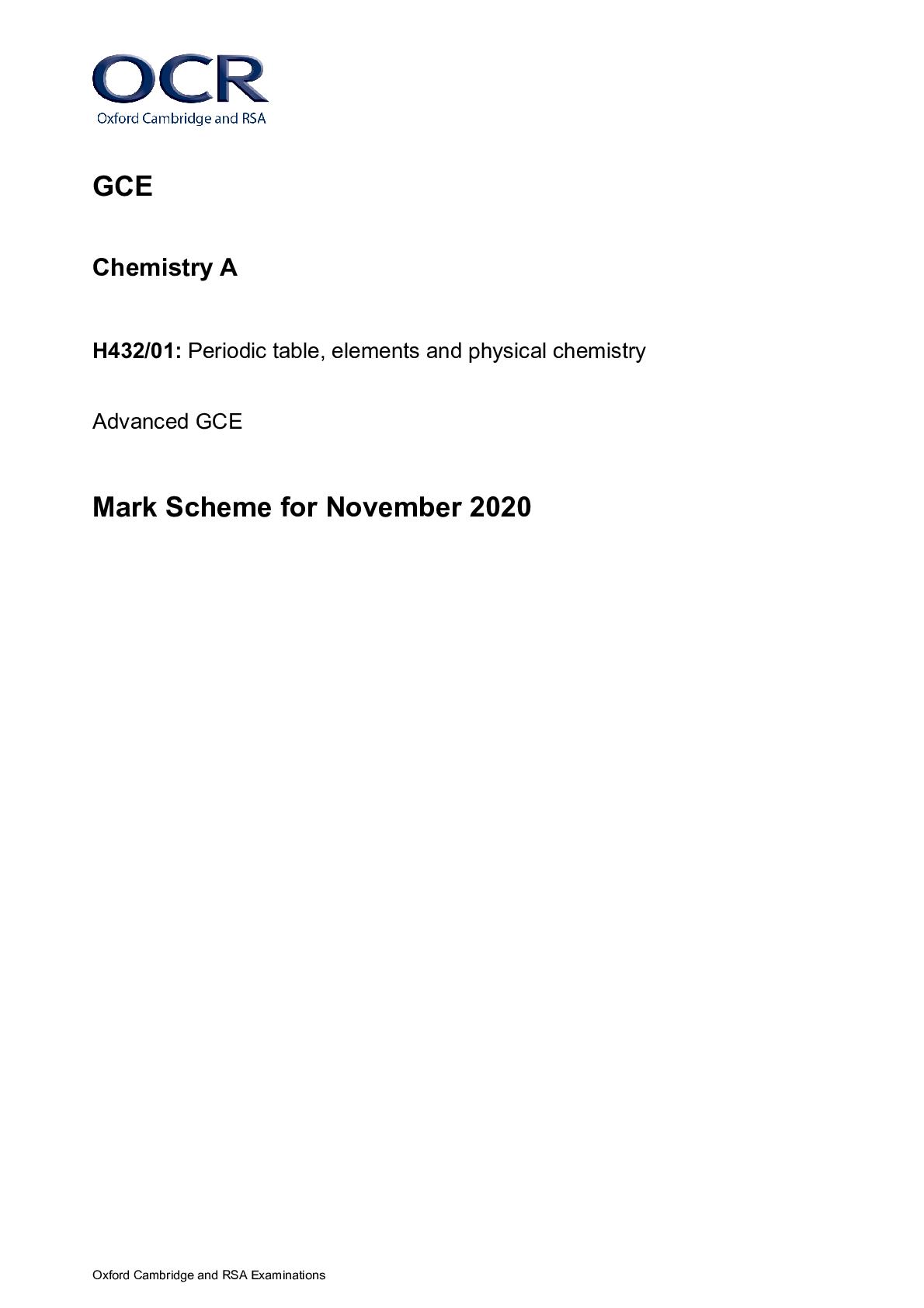
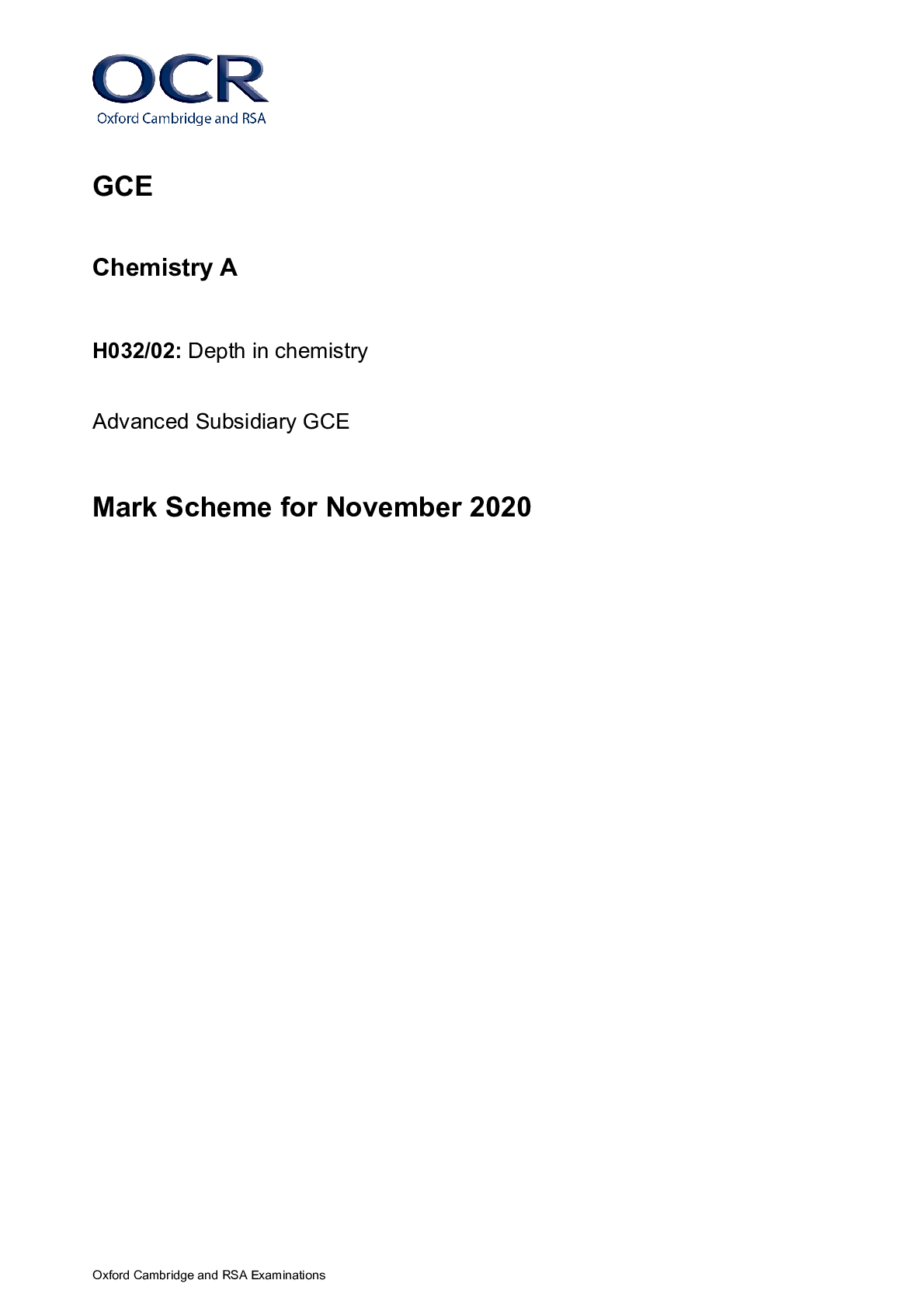

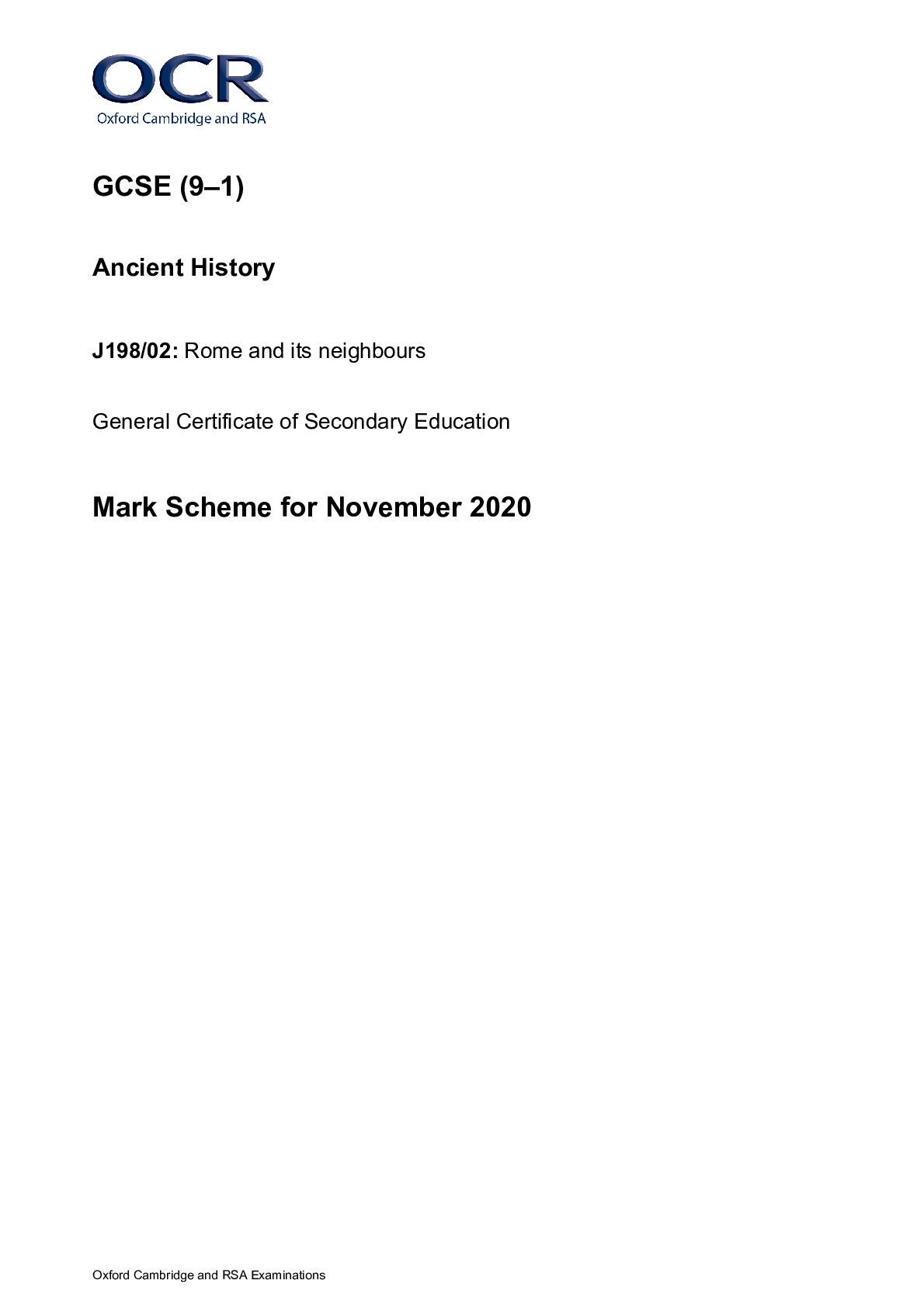




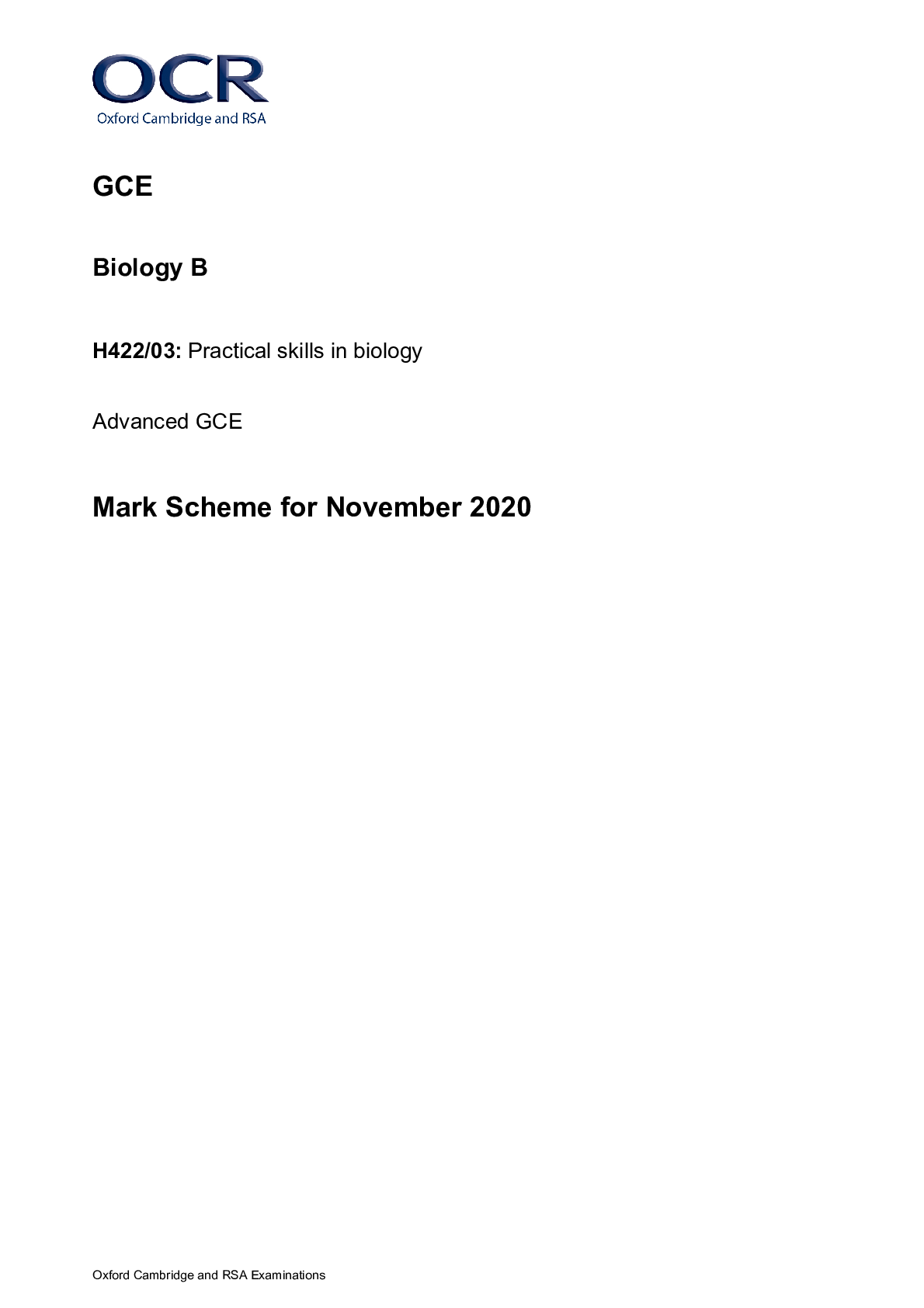
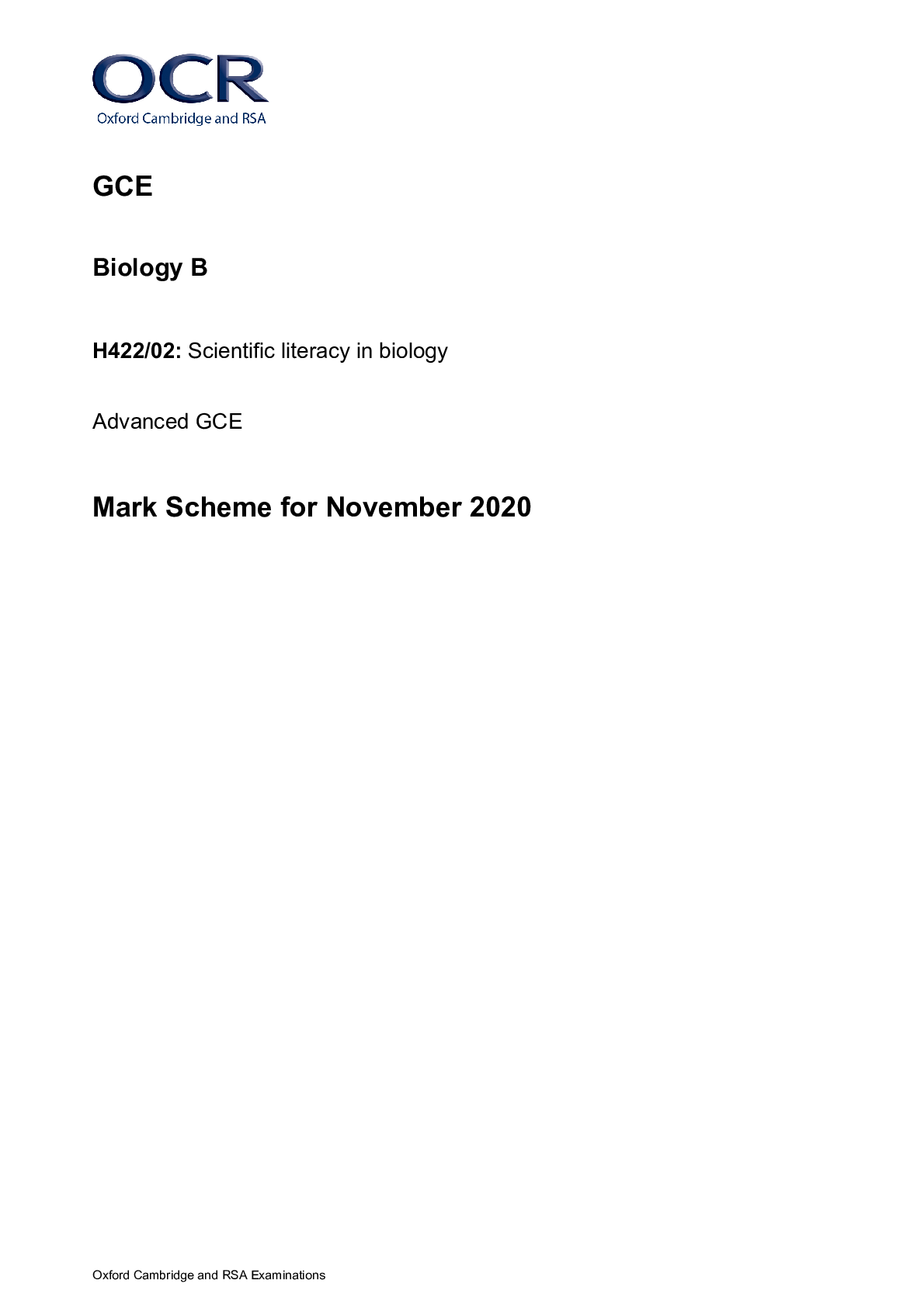
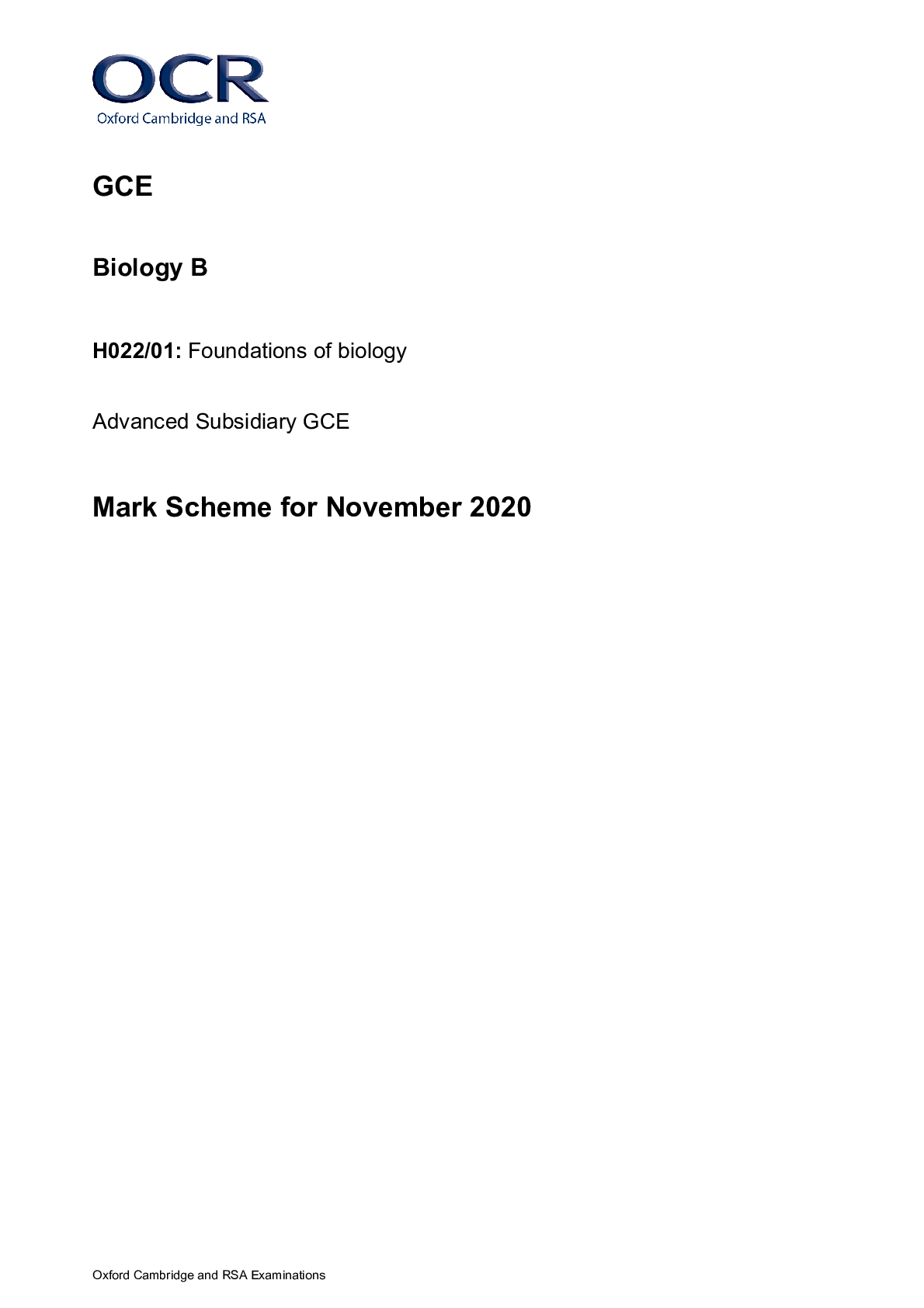



.png)



